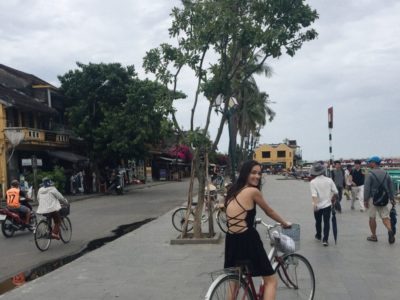I’ve remained on the fringes of two different and separate Anchorage, Alaska communities. I have a Caucasian father and Vietnamese mother. My high school friends often talked about my ethnicity and attempted to place me into a defined racial category. Some of my peers pegged me as an Asian immigrant, some have asked if I am Native Alaskan, and others simply asked ‘What are you?’
I hoped that in leaving for my college years with the conscientious and international student body at George Washington University, I would finally feel like I belong.
Unfortunately, my hopes did not match my reality. A few months into my freshman year at GW I found that my college peers also cast me as “the other.” Although I’m equal parts Asian and White, to my white friends I’m Asian and to my Asian friends, I’m white. My bi-cultural heritage once again left me excluded from being included in ether community.
My sophomore year rolled around I felt upset and alone. I felt disappointed that my high expectations for my college weren’t met. I began to retreat within myself. At times I felt almost a discernible barrier between my predominantly white sorority friends. My friends talked and reminisced about their family trips to Disneyland, Easter masses and Nickelodeon—things that were very much not a part of my childhood. These conversations highlighted the differences between my friends and me and made it difficult for me to relate to their experiences. Conversely, my less-than-perfect Vietnamese and predominantly Western upbringing cast me as an outsider in Asian student groups. In an attempt to take control of my self-discovery, I begged my mom to enroll me in a Vietnam study abroad program.
My mother agreed, so I said goodbye to my best friends remaining in D.C. and packed my bags for Ho Chi Minh City. I took Vietnamese language classes at the College for Humanities and Social Sciences in Saigon. I hoped that my fortified language skills would make me feel more in touch with the Vietnamese half of my ethnicity.
I believed that my summer in Vietnam would make me feel less lost. My language class peers were almost exclusively Korean students. Most days after class I found myself eating in the campus café solo, and I realized that despite my improved language skills, I felt as lonely as I always did. I grew to miss peers who shared my American experience. I realized that my days on my Saigon campus felt even more isolating than those at GW.
After my awakening summer in Vietnam, I returned to GW for my junior year. I decided to embrace my friends and my life in Washington D.C. with open arms. I found clarity during my summer in Vietnam but I still feel lost at times. I realize I don’t entirely belong to any community, but my summer taught me that I have a choice. I could continue to be engulfed by debilitating self-misunderstanding, or I could embrace the uncertainty and find an identity independent of my amorphous ethnicity.
My return to GW helped me find myself ways I never thought possible. I’m on my way to forming a sense of self on my own terms and my life is fuller as a result. I think of myself as a traveler, a foodie, a passionate student, a news and media junkie, a social justice enthusiast and more. My life means much more than just my ethnicity. I now understand that I have the agency and self-determination to decide who I want to be.
My kind, intelligent and inspiring friends that I have leaned on countless times have made my college experience and self-discovery easier. My good friend Emily, the daughter of Russian immigrants, has played an exceptionally large part in helping me sort out the pieces of who I am. “It must be hard to be pulled in two different directions,” she said over coffee one afternoon. “But in a way, aren’t you glad it’s hard? Isn’t your story what makes you who you are?”
I’ve come to realize that she is right. I am an amalgam of two cultures, which has ultimately made me a person that I am proud to be. I wouldn’t trade my confusion of my college self-discovery for anything.



















